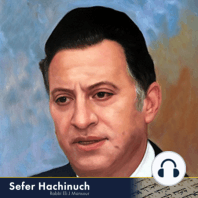20 min listen
Misva #360: Ma’aser Behema (Tithing Cattle)
FromSefer Hachinuch
ratings:
Length:
20 minutes
Released:
Jan 3, 2023
Format:
Podcast episode
Description
The Torah in Parashat Behukotai (Vayikra 27:32) introduces the command of “Ma’aser Behema” – to tithe one’s herds of kosher animals each year. This means that once a year, one who owns kosher animals must assemble them in a pan that has a passageway with room for only one animal to walk through it, and have the animal pass through. (The mother is brought outside the pen so that the young animals will leave the pen to go to her.) The owner counts each animal, and he colors every tenth animal with a stripe, designating it as sacred. The marked animals must then be brought to Jerusalem where they are slaughtered as sacrifices and eaten in the city. In explaining the reason behind this Misva, the Sefer Ha’hinuch observes that the Torah introduces numerous different obligations that require going to Jerusalem. In addition to Ma’aser Behema (the animal tithe), one must bring one-tenth of his agricultural produce to Jerusalem (Ma’aser Sheni), as well as the fruits of a tree’s fourth year (Neta Rivai) and the annual Bikkurim (first fruits). The reason, the Sefer Ha’hinuch writes, is because most people are generally drawn after their professions or commercial enterprises, and the Torah seeks to direct our focus towards Torah learning. It therefore arranged that a person would have to travel to Jerusalem, the center of Torah learning and scholarship, several times a year. A person will likely decide to purchase a property in Jerusalem, so he can spend time there, and he will then be regularly exposed to, and influenced by, the Rabbis and Kohanim. Or, the Sefer Ha’hinuch writes, one might have his son reside in Jerusalem and send him all the foods which the Torah requires eating there. The son will then likely devote himself to Torah and become a great scholar. The result will be that every family will have at least one Rabbi, and this will have a profound influence upon the nation. This Misva applies to both men and women, both in Israel and outside the land, and even after the destruction of the Bet Ha’mikdash. Fundamentally, then, even nowadays, a Jew who owns kosher animals is required to designate one-tenth of his cattle each year as Ma’aser Behema. However, the Sages enacted that one should not consecrate one-tenth of his animals nowadays, in the absence of the Bet Ha’mikdash, because it is forbidden to slaughter a consecrated animal outside the Bet Ha’mikdash until it develops a Mum (physical blemish that disqualifies it as a sacrifice). If one would consecrate animals as Ma’aser Behema, he or someone else might end up slaughtering it, in violation of the grave prohibition of Shehuteh Hutz – slaughtering animals outside the Bet Ha’mikdash. The Sages therefore suspended the Misva of Ma’aser Behema nowadays, and one does not consecrate one-tenth of his animals in our times, when they would be unable to be offered as sacrifices.
Released:
Jan 3, 2023
Format:
Podcast episode
Titles in the series (100)
Misva #10: The Obligation to Eat Masa: Daily Sefer Hachinuch - Brought to you by itorah.com by Sefer Hachinuch
